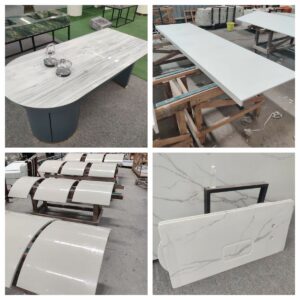Introduction to Nanoglass Countertops
Nanoglass countertops, commonly known as nano-crystallized glass, are a relatively new addition to the world of kitchen design. They are also referred to by other names such as nanoporous marmoglass and nano crystal stone. This factory-manufactured material is a blend of natural materials and silica, offering a luxurious look of an all-white kitchen countertop without veins or grout lines. The result is a smooth, uninterrupted surface that exudes modern elegance.

Origin of Nanoglass
Most nanoglass countertops were initially manufactured in China and then imported into the United States. However, in recent times, several American companies have begun producing their own branded versions, making it more accessible in the market.
Features of Nanoglass
- Composition and Appearance: Nanoglass is created from real glass that has been transformed into a fine powder and then combined with resin. This process results in a hard, durable surface that is both scratch and heat resistant. Its predominant white color, a byproduct of its manufacturing process, offers a clean and sophisticated look, making it a popular choice for modern kitchens.
- Durability and Maintenance: One of the standout features of nanoglass is its durability. It can withstand heat from pots and pans without warping or cracking. Additionally, its non-porous nature means it resists stains better than many other materials, such as granite, marble, or quartz. Cleaning is a breeze; a simple wipe with a damp cloth is often all that’s needed.
- Flexibility in Design: While nanoglass is predominantly white, it is available in a variety of colors and styles, allowing homeowners to choose the perfect shade to complement their kitchen décor.
Pros and Cons of Nanoglass Countertops
Pros:
- Strength: Nanoglass countertops are incredibly durable, capable of handling weight, pressure, and heat without breaking or chipping.
- Cost-Effective: While not the cheapest option, nanoglass is a more affordable alternative to genuine white marble.
- Water-Resistant: Its non-porous nature makes it highly resistant to water, an essential quality for kitchen countertops.
Cons:
- Installation Challenges: Due to its hardness, nanoglass can be brittle, making installation a task best left to professionals.
- Limited Customization: Its solid surface means DIY trimming or adjustments are challenging.
Pricing Considerations
The cost of nanoglass countertops varies based on factors such as origin (imported vs. locally produced) and brand. On average, prices hover around $58 per square foot. However, it’s essential to factor in installation costs, which can range from $10 to $30 per square foot.
Eco-Friendly Aspect
Nanoglass countertops are environmentally friendly, primarily when made from recycled glass. This sustainable approach, combined with its durability and aesthetic appeal, makes it a sought-after choice for eco-conscious homeowners.
Conclusion and Company Overview
In the realm of kitchen design, nanoglass countertops stand out as a blend of beauty and functionality. Their sleek appearance, combined with durability and ease of maintenance, makes them a worthy investment for homeowners seeking a modern and sophisticated look.
For those interested in exploring nanoglass countertops further, Zonve Nano Stone offers a range of high-quality options. Made from recycled glass, our countertops are not only stylish but also eco-friendly. With a commitment to excellence and customer satisfaction, Zonve Nano Stone is the go-to choice for premium nanoglass countertops.
